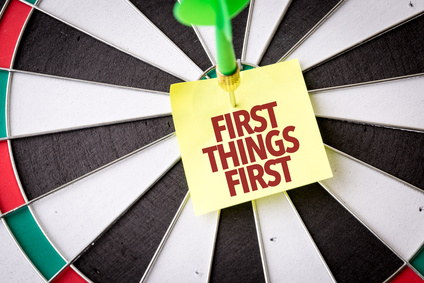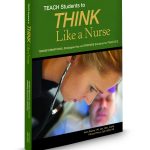
Here’s a simple test question for educators. What is the best response?
What is the first and most crucial step that is needed to best prepare your students for practice and the current and upcoming Next Generation NCLEX®?
- Repeated practice with Next Generation NCLEX® style test questions that utilize the latest technology.
- Change and transform the way you teach.
- Do nothing differently. The NCLEX will not change in my lifetime.
If you chose response #2, you are correct and on the right path!
There is no shortage of strategies that are being marketed to nurse educators that emphasize creating and developing NCLEX® style test questions that will mirror this much more rigorous licensure examination.
I believe this approach is shortsighted and there is a better way.
To recognize what is the best first step that you and your program must implement to develop clinical judgment this principle must be understood about the construct of clinical judgment:
Clinical judgment cannot be taught directly.
It is an OUTCOME when students can both critically think by understanding and applying essential content, then reasoning with this knowledge to the bedside of patient care (Alfaro-LeFevre, 2017).
The NCSBN definition of clinical judgment affirms this same observation:
- Clinical judgment is an observed OUTCOME of critical thinking and decision-making.
- It is an iterative (repetitive) process that uses nursing KNOWLEDGE to observe and access presenting situations
- It identifies a prioritized client concern
- Generates the best possible evidence-based solutions to deliver safe client care (Next Generation NCLEX News, 2018).
Before your program focuses on Next Generation NCLEX® preparation through developing or purchasing Next Generation NCLEX® style test questions, start making the following program changes FIRST, or nothing will change (including your NCLEX® scores!)
This is why Next Generation NCLEX® is the best thing that could happen to nursing education!
1. Eliminate TMI and Infobesity in Your Content and Curriculum
Students must acquire an in-depth knowledge of what is most important to use and apply knowledge.
The essence of critical thinking is the ability of the nurse to think clearly, precisely, accurately, and to act on what a nurse knows and understands (Potter & Perry, 2012).
Your students must be able to use knowledge and apply it to the bedside, not merely memorize it to pass your next test and then the NCLEX.
Covering the content with way too many PowerPoint slides prevents students from recognizing what is most and least important.
This is why TMI and infobesity must first be confronted and removed from your content if your students are going to develop the critical thinking required to be practice-ready and be successful on the current and upcoming Next Generation NCLEX.
2. Make Learning Active
Once essential content is deeply understood, it must be contextualized to the bedside of patient care with active learning that provides repeated practice in the safety of the classroom.
Case studies offer this needed context and can help develop the critical thinking and problem-solving abilities students require for practice.
Though high-fidelity simulation is an effective strategy to develop clinical judgment most students do not get to utilize this experience often enough as a student.
That is why it is essential to provide some form of active learning in your classroom every time you teach. Case studies that capture salient realities provide low fidelity simulation that helps students put the clinical picture together and can offer the same benefits of high-fidelity simulation except there is no manikin or simulated clinical environment.
Next Generation NCLEX® will emphasize numerous case studies on a wide variety of topics. Utilizing clinical reasoning case studies in your classroom and program ASAP will effectively prepare your students for this much more rigorous licensure examination.
3. Emphasize Clinical Reasoning
To transform nursing education, clinical reasoning is an essential nurse thinking skill that needs to be emphasized (Benner, Sutphen, Leonard, & Day, 2010).
Dr. Patricia Benner has one of the most practical and useful definitions of clinical reasoning that can help every nurse educator utilize these principles to develop the clinical judgment required for safe patient care:
- Grasp the essence of the current clinical situation
- THINK IN ACTION and REASON as a situation CHANGES over time
- Filter clinical data to recognize what is MOST and least important
- Capture and UNDERSTAND the significance of clinical TRENDS
- IDENTIFY the nursing priority and respond appropriately
- Determine if an actual problem present and respond accordingly (Benner et al.)
I have created and refined unique case studies that emphasize clinical reasoning that incorporates this definition of reasoning and all three of these paradigm shifts together in one effective learning tool.
Click this link to learn more and see current case study topics can help you transform the way you teach!
Nursing Education: At the Crossroads
Did you know that these three recommendations to develop clinical judgment were the essence of the paradigm shifts advocated in Educating Nurses almost ten years ago?
Unfortunately, these needed changes have not been widely implemented in nursing education in the United States.
In the groundbreaking article, A Crisis in Competency (Kavanagh & Szweda, 2017) identified that only 23% of graduate nurses, all who passed the NCLEX® met entry-level expectations of clinical decision-making. In their conclusion they wrote:
“New data suggest that we are LOSING GROUND in the quest for entry-level competency.”
How could this happen? Despite having the right information available, too many educators are not implementing educational best practice.
Imagine…
I confess that I am an old-school nurse who graduated from an associate degree program back in 1983. There were no HESI, ATI, or Kaplan programs to measure my likelihood of NCLEX® success throughout the program. I was taught well, studied hard and passed the NCLEX®.
As a newer nurse educator, I am surprised by the widespread utilization and prevalence of NCLEX® predictive testing that students are paying significant sums of money for.
An unintended consequence is that an emphasis and culture of “NCLEX success” is created and nursing education has lost sight of the other equally important priority of preparing students for real-world practice.
Though there are benefits to student learning and identification of current weaknesses and strengths, but imagine what could be accomplished if every nurse educator simply embraced educational best practice and did the following:
Confronted infobesity by removing “nice to know” content from classroom lectures, learning was made active by applying essential knowledge through case studies and other relevant strategies that practiced clinical reasoning.
If nurse educators implemented educational best practice and expected students to partner in the learning process, I am willing to bet that NCLEX® success will take care of itself with or without the current culture of predictive testing.
In Closing
Do not let NextGen NCLEX keep your focus on the NCLEX licensure as the priority and endpoint of your program. Equally important is preparing students for practice.
Before emphasizing Next Generation NCLEX® style test questions in your program, be sure that you and all other educators in your program transform the way they teach.
Reflect on your teaching and start making needed changes based on educational best practice.
Be ruthless and eliminate infobesity and make classroom learning active with case-based learning that emphasizes clinical reasoning.
Then create and practice with NextGen NCLEX® test questions, but do not put the cart before the horse! Transform the way you teach today to best prepare students for practice tomorrow!
References
- Alfaro-LeFevre, R. (2017). Critical thinking, clinical reasoning, and clinical judgment: A practical approach. (6th ed.). St. Louis, MO: Elsevier–Saunders.
- Benner, P., Sutphen, M., Leonard, V., & Day, L. (2010). Educating nurses: A call for radical transformation. San Francisco, CA: Jossey-Bass.
- Kavanagh, J. & Szweda, J. (2017). A crisis in competency: The strategic and ethical imperative to assessing new graduate nurses’ clinical reasoning. Nursing Education Perspectives 38(2), 57-62.
- Next Generation NCLEX News. (2018). Retrieved from https://www.ncsbn.org/11998.htm
- Potter, P. A. & Perry, A. G. (2012). Fundamentals of nursing. (8th ed.). St. Louis, MO: Mosby–Elsevier.
Related Blogs
- Seven Pearls to Transform Your Practice as an Educator
- How to Strengthen and Develop the Critical Thinking Students Require for Practice
- How to Use the Science of Learning to Help Students Think More Like a Nurse
Guide to Implement Change for Educators
I wrote TEACH Students to THINK Like a Nurse to be a written guide to successfully implement educational best-practice to develop the thinking required for practice and the current and upcoming NextGen NCLEX®.
Keith Rischer – PhD, RN, CEN
As a nurse with over 35 years of experience who remained in practice as an educator, I’ve witnessed the gap between how nursing is taught and how it is practiced, and I decided to do something about it! Read more…
The Ultimate Solution to Develop Clinical Judgment Skills
KeithRN’s Think Like a Nurse Membership
Access exclusive active learning resources for faculty and students, including KeithRN Case Studies, making it your go-to resource.




